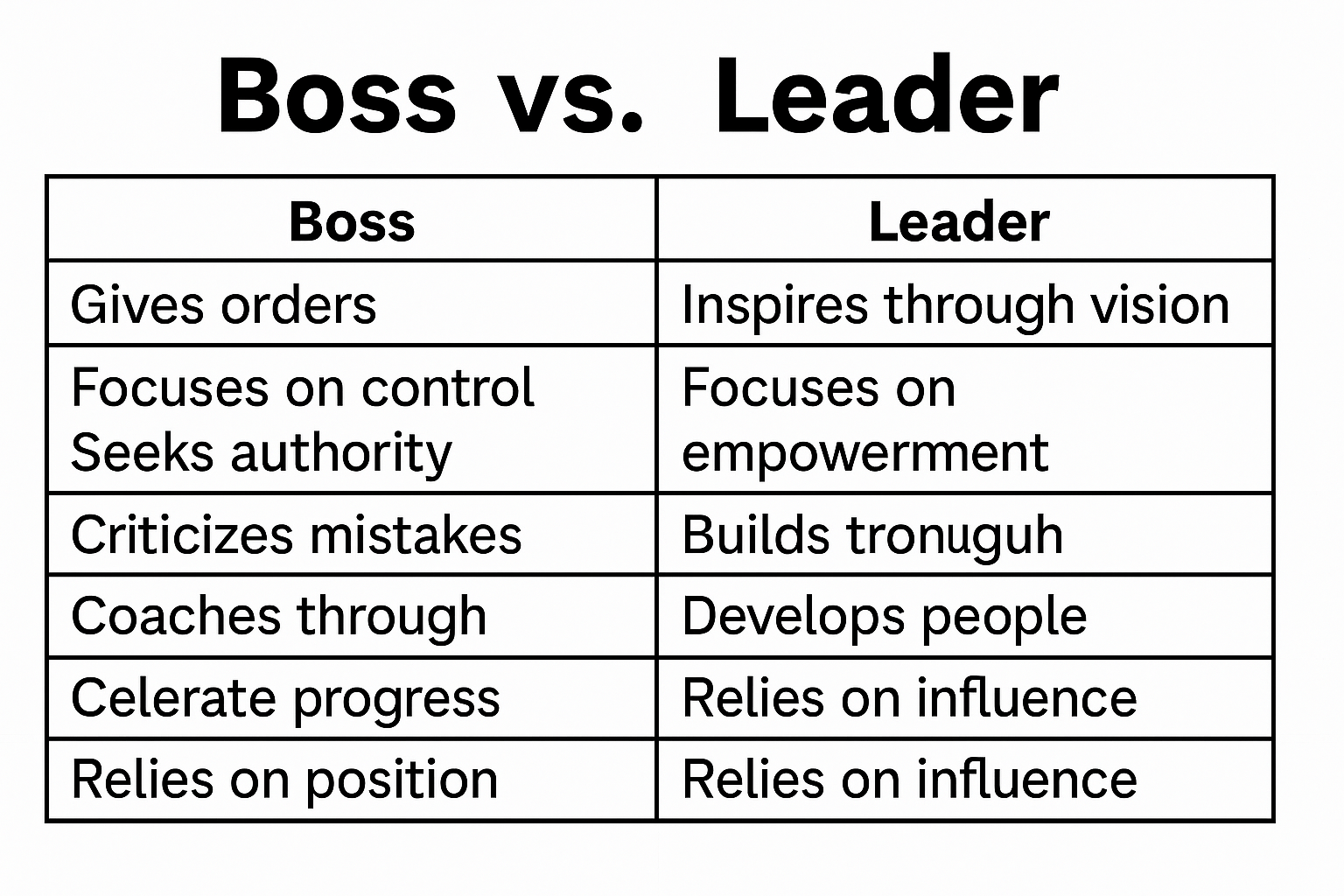We’ve all had a “boss” at some point, but not everyone has experienced a true leader. The distinction between the two is more than semantics. It’s a reflection of mindset, behavior, and the kind of impact a person leaves on those around them. Understanding the difference in the boss vs leader debate is essential for anyone who wants to grow beyond authority and step into genuine influence.
Why the Boss vs Leader Debate Matters
Titles don’t define leadership actions do. While a boss may have the authority to direct others, a leader earns respect through vision, trust, and empowerment. In a time when employee engagement, innovation, and workplace well-being are key success factors, this distinction is more critical than ever.
In fact, countless studies show that people don’t leave companies, they leave bosses. A controlling, fear-based environment may get short-term results, but it drives long-term disengagement and turnover. Leaders, on the other hand, inspire loyalty, initiative, and collaboration.
This distinction is echoed in Leadership Strategy and Tactics: How to Lead with Precision and Impact, where Matthew Mathison explains how great leaders move fluidly between strategic vision and tactical execution to create real influence.
Boss vs Leader: A Side-by-Side Comparison
Let’s break down the core differences between a boss and a leader:

A Boss Directs, A Leader Guides
A boss may tell you what to do, but a leader will show you why it matters. Leaders provide context, purpose, and meaning to tasks, making people feel like they’re part of something bigger. That sense of meaning drives deeper engagement, loyalty, and ownership.
A Boss Controls, A Leader Empowers
While bosses often micromanage, leaders trust their teams. Empowerment encourages innovation, ownership, and accountability. This trust creates space for people to grow into their potential instead of shrinking to meet expectations.
A Boss Blames, A Leader Learns
When things go wrong, a boss looks for someone to blame. A leader sees failure as a learning opportunity, taking responsibility and encouraging growth. They ask: “What can we learn?” rather than “Who messed up?”

The Psychology Behind Leadership Influence
In the boss vs leader equation, emotional intelligence (EQ) plays a massive role. Bosses who lack self-awareness often lead with ego, while leaders understand their emotions, regulate their responses, and empathize with their team’s needs.
According to psychologist Daniel Goleman, EQ is more important than IQ when it comes to effective leadership. Leaders who are emotionally intelligent build stronger relationships, resolve conflicts better, and motivate others more effectively.
This connection between mindset and leadership is explored in greater depth in Master Your Mindset: How to Think Like a Leader and Win, where Matthew Mathison outlines how intentional thinking can transform leadership impact.
Real-World Examples: Boss vs Leader in Action
- Boss Example: A manager at a retail chain enforces strict rules without flexibility, criticizes staff in front of others, and measures performance only by numbers. Result: high turnover and low morale.
- Leader Example: A project manager creates space for team input, supports personal development, and leads with vision. Result: improved collaboration, higher productivity, and greater team satisfaction.
Even in high-pressure industries, leaders outperform bosses in the long run by creating cultures of resilience and commitment rather than fear and compliance.
How to Transition from Boss to Leader
If you find yourself in a position of authority and want to lead more effectively, here are some practical shifts you can make:
Focus on Purpose, Not Just Performance
People perform better when they know why their work matters. Connect roles to a broader mission and invite your team into that vision. Help them see how their contributions align with the organization's goals.
Ask, Don’t Just Tell
Great leaders ask questions that spark critical thinking and ownership: “What do you think?” “How would you approach this?” This shift from telling to asking builds confidence and opens communication.
Prioritize Development Over Control
Invest in your team’s growth. Offer feedback, mentorship, and autonomy rather than hovering over their every move. When people feel supported, they rise to the occasion.
Lead with Values, Not Fear
Fear-based leadership may control behavior, but it kills creativity and trust. Lead with integrity, empathy, and humility. Be the kind of leader others aspire to become.
Model What You Expect
Want accountability, resilience, or innovation? Demonstrate those traits yourself. Leadership is contagious. People are more likely to mirror your behavior than follow your words.
The Impact of Being a True Leader
Shifting from a boss to a leader isn’t just good for your team it’s good for your career. Leaders who inspire and empower are more likely to be promoted, trusted, and followed. They create environments where people thrive, not just survive.
This transformation aligns with the philosophy explored in Leadership Orbit, which offers a roadmap for becoming a leader who drives sustainable impact.
Leadership Rooted in Hope and Responsibility
That same spirit of ownership is explored in his Entrepreneur article on personal responsibility, where he emphasizes that great leadership begins with internal accountability not external control.
Final Thoughts
The boss vs leader distinction isn’t about being perfect. It’s about being intentional. Every day, you have the opportunity to choose how you show up: to control or to inspire, to manage tasks or to develop people.
Great leaders aren’t born. They’re built one decision at a time.


